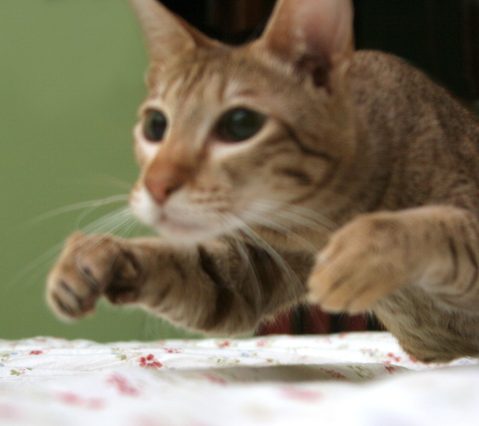Welcome, my fellow Felines.
Hopefully I find you all well and coping in ‘Lockdown Land’ – with having your Human staff around a lot more at the moment, and I trust finding plenty of things for them to do (for you of course).
Now of course one of those duties is to entertain us. This can include you gliding through and around their legs whilst they are carrying a tray or some such awkward or preferably heavy/ wobbly/ breakable item – showing them that a superior balance system is a leg on each corner, rather than that ungainly top heavy two leg set up they strangely favour. It should also most certainly include them actually playing with us, in the physical sense of moving our toys in an amusing way, and throwing and fetching them as required – this helps to keep you stimulated and them fit too!
However whilst play of this kind is to be welcomed – a slightly unfortunate side effect is that it can invoke all those ancestral urges – you know when we had to get our paws dirty and hunt, whilst awaiting for Humans to evolve so we could domesticate them – and try as one may to avoid it, sometimes, we can go a bit far with the claws or even teeth… so here’s a bit of advice to pass on to your staff if you do inflict a bit of damage…
you see we Cats (and dogs) carry an unpleasant little lodger called Pasteurella multocida which can be transferred via scratches or bites
Firstly, don’t let them panic – the first thing with, say, a more minor wound, e.g. a scratch, is to clean it straight away… so wash thoroughly with soap, and then dry, and if required apply pressure to stop any bleeding, and as it’s most likely to be a hand, raise it wherever possible to help this. Then once this has stopped, get them to apply an antiseptic cream, or if they’re brave, a generous dab of something like TCP, making sure that it gets right into the affected area, and if possible a plaster will help to keep the medication in place and further dirt out. It’s best if the plaster is only kept on for a short time or changed regularly; you see we Cats (and dogs) carry an unpleasant little lodger called Pasteurella multocida, which can be transferred via scratches or bites and likes to manifest its infectious signs within 24 hours – inflammation, puffiness, redness and soreness, so it’s advisable to keep any damage observable and regularly cleaned to prevent this happening.
they may well end up in one of those big NHS Human Vet practices we hear so much about at the moment
Now, should any of those nasty signs occur, despite your Humans best efforts and it appears to be causing them concern or further pain, they should get themselves along to a Human Vet as soon as possible, as untreated these rotten little bugs can cause an awful lot of trouble, especially if you’ve forgotten your manners and it’s a bite that’s the source – they may well end up in one of those big NHS Human Vet practices we hear so much about at the moment, if they ignore what’s going on – a trait unfortunately more prevalently found in the Male gender of Humans, they do like to “soldier on”, bless them!
The best thing is, these little rotters can be sorted with prompt application of antibiotics – I hear Amoxicillin is a general application. So, my advice is: try not to get carried away, remember it’s best not to bite the hand that feeds you ( and plumps your bed, opens the door(s) for you, etc.) but if your Human isn’t quick enough to avoid your, ahem, Cat-like reflexes, then make sure they follow the advice above, and in no time they should be back to their useful and willing selves!
Keep calm, keep safe and try to keep those claws to yourselves!
Happy Purring ’til next time,
Gollum
Photo by Derek Jones from FreeImages
